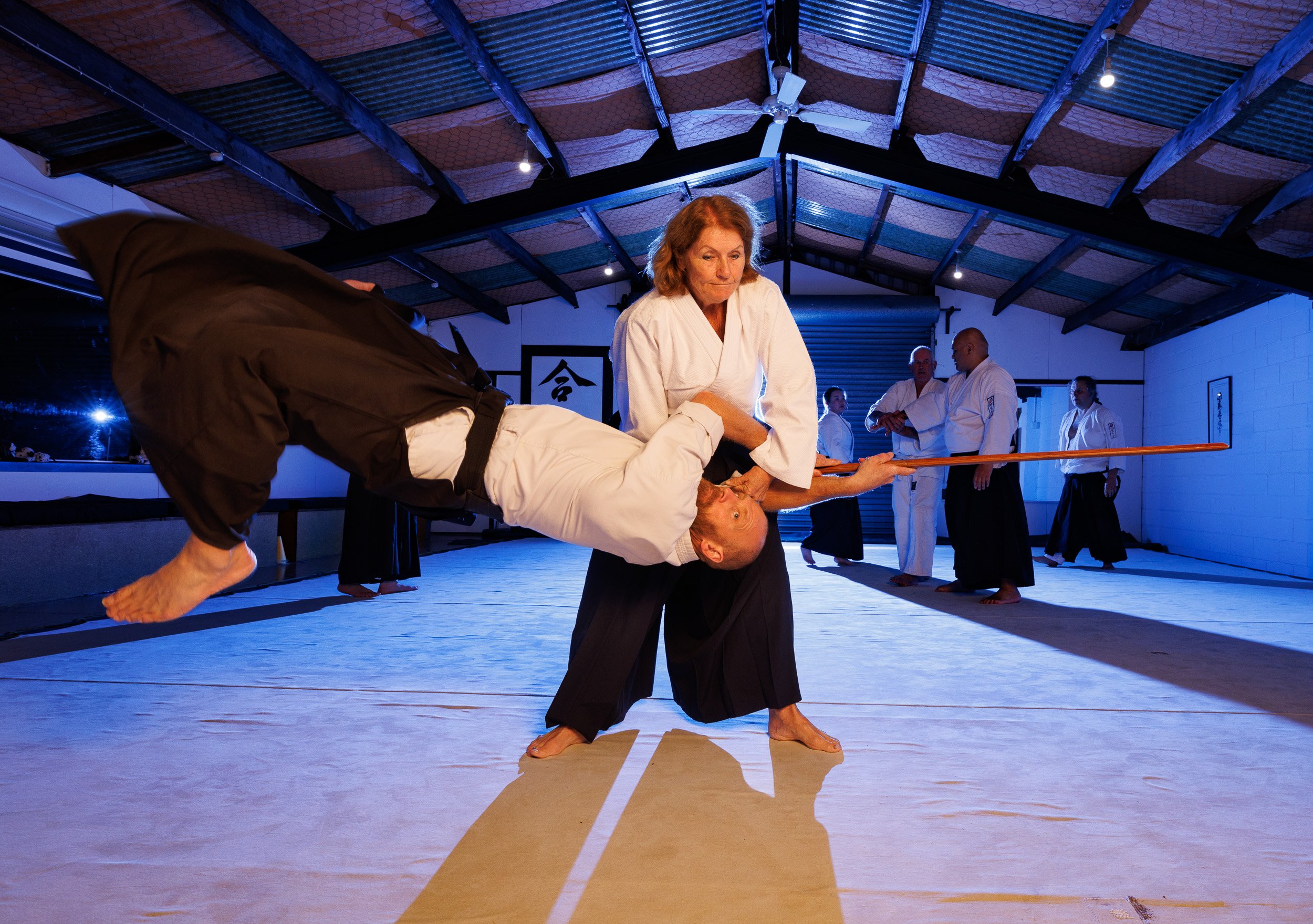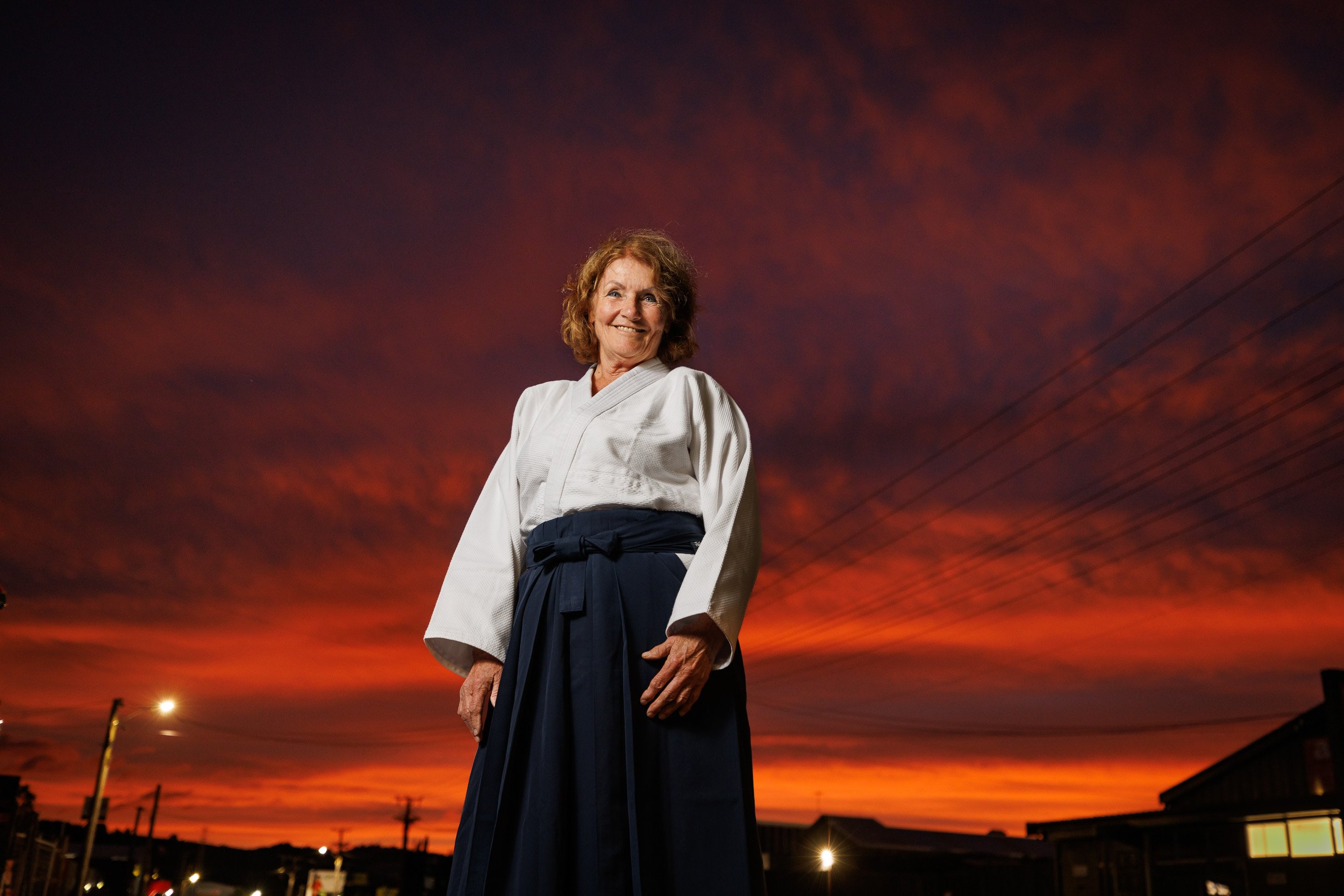
Dianne Haynes
Aikido black belt, compassionate nurse – meeting a woman of polar opposites
Words Jill Nicholas
Pictures/video Stephen Parker
Professionally, Dianne Haynes is a skilled nurse tending patients in Rotorua Hospital’s theatre recovery room.
Recreationally, she’s about as far from that compassionate setting as it’s possible to
get.
The reason? She’s a leading exponent of the defensive Japanese martial art, Aikido.
So proficient has Dianne become after 45 years on the Aikido mat that she’s recently been awarded her sixth degree, or Rokudan, black belt and has been a member of the Aikido Hall of Fame since 2005.
Impressive as that may be it’s all the more so when it’s factored in that Dianne is 72 and lacks sight in one eye.
It’s an affliction she’s lived with since she was 13 and fell out of a bunk at her family’s Mt Maunganui bach. She spent much of the following year in hospital.
“That included three months in a darkened room at two different times while the doctors were trying to realign my eye but were unable to,” Dianne tells us in the most matter-of-fact way.
That’s because she’s never allowed her restricted vision to hinder her. “Apart from missed school work that set my education back I don’t think I’ve struggled with it. I had to learn early on to adapt in everything I do, how to compensate for it.”
That’s included Aikido where peripheral vision’s a vital component because it’s needed to suss out opponents’ movements.
Woman of many parts
In Dianne Haynes’ world the phrase ‘everything I do’ embraces a list of considerable length.
She’s a nurse who’s trained twice over, first as an enrolled nurse, then a decade later, as a diploma student which allowed her to become fully registered.
She has papers towards an education diploma “before I decided I didn’t want to train nursing students,” a diploma in business studies and is qualified as a play centre supervisor. She combined work on that front with weekend nursing when her two sons were small.
This versatile woman is a JP who is qualified to dispense justice. She’s sat on the Rotorua bench and in greater Auckland’s four district courts. Now retired from judicial duties she works closely with the police, assisting with multifaceted documentation.
She taught self-defence to Rotorua women for 10 to 12 years, averaging 20 women a class twice a year.
“It was immensely rewarding for me and the women . . . by the end they were very firey and confident they could look after themselves.”
She’s a marriage celebrant and has only recently relinquished her passenger service driver’s licence. “At one stage I toyed with being a bus or truck driver.”
Dianne’s lifetime of nursing merits a segment of its own and we’ll return to it once she’s taken us through what has become a stellar Aikido career.
Black belt status
Reluctant to put a figure on how many other Kiwi women have reached sixth dan (black belt) level she guestimates about two or three, all younger than her and not in the technique she practices.
“It’s known as Tatsu Gi Kai, best described as a system to defend one’s self from attack. It’s far from passive, involving physical contact and weaponry. Once this included knives and swords. Today students practice with varying sized wooden staffs, [each staff’s known as a jo], wooden swords or bokken and wooden knives.
Beyond black belt level live metal swords are often used in practice.”
Dianne was introduced to Aikido in 1976 when her first husband, Brian Cowley, attended the Onehunga club.
“I didn’t want to be a bitchy wife stuck at home with the kids so I went along to see what Aikido was all about. I thought ‘I can do this’, but I didn’t see any women there. I talked a friend into joining with me.
“It was quite hard at first with all these young males with high levels of testosterone, but I leant to manage them quite well. My passion for Aikido developed over time from there.”
She acquired her first black belt in 1982, the year after completing her nursing diploma.
Perfecting techniques
She was still at green belt (intermediate level) when a visiting overseas sensie (instructor) introduced her to a new way of learning Aikido’s numerous techniques.
“By the time you sit your first black belt grading you know at least 375 techniques.
In Aikido to be graded you don’t fight someone, you demonstrate techniques. At each grading level you need to known nine techniques [adding to them at each level].
“You need to be committed to learn, it helps to start young, it’s hard to get an adult to tumble over and over.”
Dianne gave the In Profile team an impressive demonstration of forward rolls but claims not to be as proficient as she once was.
“We do exercises to limber up the body ready for how to roll over the arm and shoulder.”
Pain goes with the Aikido territory.
“In a defensive situation if you are thrown and land on your back that’s painful, there is pain in the wrists and elbows with the different locks. People tend to tap out when it becomes too painful, so you have to submit.”
(To ‘tap out’ in a martial arts speak is to tap the floor to show your competitor they’ve beaten you.)
Has she ever used the skills Aikido’s given her outside the dojo (training centre)?
“Once I helped traffic officer who’d stopped a drunk driver. Another time they came in handy when a psychotic patient with a weapon attacked me, that was pretty scary.”
Then there was the gang member Dianne subdued. “Coming round from an anaesthetic he was confused and needed to be supported safely until he woke up.”
Each incident is proof, should any be required, that Aikido’s complexity of skills aren’t simply for show.
Dianne is saddened Aikido isn’t taught any longer at the police college, she believes this is because of a lack of skilled teachers.
“I’d love to have been part of that instruction.”
As she describes it Aikido is not passive and, unlike judo, it’s not competitive. “Mostly it is for your own growth, physically and mentally.”
Founding Rotorua dojo
In 1984 she and her second husband, Paul Haynes, moved to Rotorua which, at the time, lacked a dojo. After two years travelling to Auckland to train the Haynes’ remedied that.
They opened a three mat dojo above Advocate Print on Fenton Street. As membership grew it moved to rented premises on Riri Street.
Some years later, “after a lot of sweat and fundraising”, the club has its own dojo.
As a senior Sensi, Dianne ran it until she moved to Warkworth in 2009 to care for her ailing parents. She resumed the role after she returned to Rotorua in 2019.
She instructs throughout the North Island and grades sensies and students of brown belt dan (level) and above.
Aikido has become an all-in-the-family sport. Her younger son Damon Cowley, who lives in Auckland and has his own dojo, wears the art’s third degree black belt.
His brother, Rotorua manufacturing jeweller Nick Cowley, has a brown belt and is shortly heading for black belt status. Damon’s 18-year-old son is another member of the black belt club while his younger son presently holds the same belt as his uncle.
Dianne with her sixth dan certificate.
Nursing career
Despite her dedication to Aikido Dianne’s continued to nurse.
Her enrolled training began at Waikato Hospital when she was a little over 16. “In the days when you trained on the wards.”
Ten years on she transferred to National Women’s Hospital “at the time of the Unfortunate Experiment [when treatment was withheld from some patients with cervical cancer in situ].
“I was asked to give evidence at the Cartwright Inquiry but felt I was too junior at the time to contribute meaningfully.”
She trained as a theatre nurse there. With her diploma acquired at Auckland Institute of Technology, Dianne worked at North Shore Hospital in various wards before spending two years tending patients in Auckland Hospital’s theatre recovery room. It’s the role she’s presently reprising in Rotorua.
Soon after she and her second husband moved to Rotorua Dianne began nursing in ICU. Two years on she was appointed acting theatre manager, then theatre manager.
In 1993 she moved to what was then Queen Elizabeth Hospital (now QE Health) as surgical services manager.
“I loved that job, stayed 17 years, I had a really good boss for most of my time there. If I could choose to have a boss it would be him, he grew me as a manager. That’s when I got my diploma in business studies through Waiariki Polytech.”
Dianne was a member of the team involved in the transfer of QE’s surgical procedures to Southern Cross Hospital.
After her move to Warkworth she was theatre manager at a newly built private hospital. Theatre nursing at Takapuna’s Skin Institute followed.
“We did everything from removing skin lesions to liposuction and plastic surgery like nose jobs and face lifts. They aren’t much fun under local anaesthetic but patients do choose them.”
Keeping young, engaged
Her Rotorua return was a decision based on economy. “Realistically, I couldn’t afford to buy a house in Auckland. I planned to be a lady of leisure but by November I was in the [Rotorua Hospital] recovery room three days a week and I’m still there.”
How does she reconcile two such diametrically opposed undertakings as nursing and something as confrontational as Akido?
“Nursing is my profession, Aikido is my recreation. My biggest reward from it is to bring people to the dojo and teach them techniques I am passionate about and sharing my passion for this art.
“With Aikido I am continuing to grow inside me. It’s been my passion for more than 40 years. It keeps me young, engaged.”
DIANNE HAYNES - THE FACTS OF HER LIFE
-
Born
Matamata, 1949 to dairy farmer parents
-
Schooling
Taihoa Primary, Matamata College (one year), foundation pupil Matamata Intermediate. “Then back to the college. My parents had to buy me two uniforms in a year because the intermediate was established when I was going into what was then the second form at the college.”
-
Post College education and diplomas
Enrolled nursing, Playcentre supervisor, Diploma in Nursing, Diploma in Judicial Studies, Diploma in Business
-
Family
Sons Damon (Auckland), Nick (Rotorua), two grandsons, granddaughter
-
Interests
Family, Aikido, people, JP work. Marriage celebrancy. Interior decorating, furniture restoration
-
On Aikido
“It’s very disciplined and teaches respect for other people. We bow to each other as we start training, bow to O’Sensi (Aikido founder) and students on the mat. There’s a depth to this martial art I haven’t seen in other arts, regarding protection of each other, conflict resolution rather than aggression, so everyone wins. It’s taught me to walk away from conflict yet face it head on when required.”
-
On herself
“I think I’m a caring individual with a personality that encourages people to be part of my life. I love having friends I can share my life with, I could never be a hermit.”
-
On Rotorua
“It has an inclusive environment that’s drawn me into it.”
-
Personal philosophy
“I believe everybody has the right to live a simple, healthy life that includes sharing with others.”

Aikido
Founded in Japan by Ueshiba Morihei early 20th century although basic principles date back to medieval times
Uses twisting and throwing techniques with the aim of turning an attacker’s strength and momentum against himself. Pressure on vital nerve centres also used
Emphasises the importance of achieving complete mental calm and control of one’s own body to master an opponent’s attack
Development of courtesy and respect is an integral part of aikido training.
Belt levels: White , yellow, orange, green, blue, brown, black
- Source Encyclopaedia Britannica


